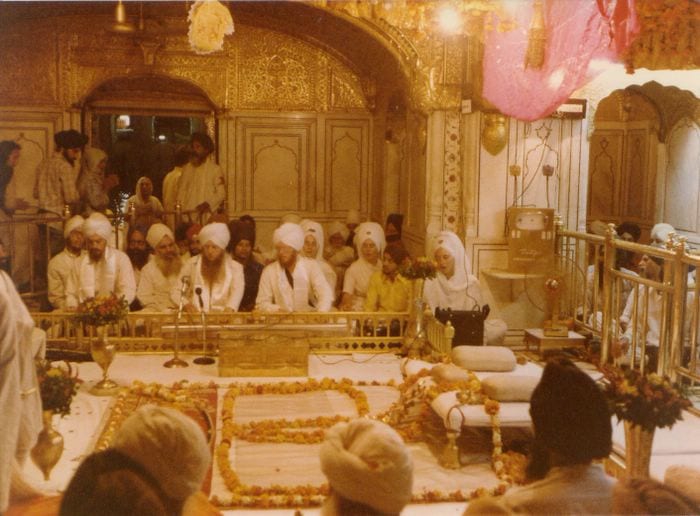ਕਥਾ (kathaa)
Meaning: noun: Discourse (on the Divine).
Quote:
ਸਭ ਤੇ ਊਤਮ ਹਰਿ ਕੀ ਕਥਾ॥
sabh te ootam har kee kathaa.
Discourse on the Divine is the most excellent of all (religious practices). – Guru Arjan Sahib, Guru Granth Sahib, 265
Message: Every spiritual traveler’s journey is unique and the possible paths or routes to the Divine are endless. Each person’s ability to understand and experience the Divine is shaped by their life experiences, perspectives, and ingrained basic assumptions.
The Gurus understood this and knew the importance of spiritual discourse when it came to understanding a subject as deep as Gurbani, where many ideas and concepts are not directly or immediately apprehensible due to one’s limited experience.
To illustrate this, the parable of the blind men and the elephant can be used:
In a distant village, a long time ago, there lived six blind men. One day the villagers announced, “Hey, there is an elephant in the village today.”
They had never seen or felt an elephant before and so decided, “Even though we would not be able to see it, let us go and feel it anyway.” And thus they went down to the village to touch and feel the elephant to learn what animal this was and they described it as follows:
“Hey, the elephant is a pillar,” said the first man who touched his leg.
“Oh, no! It is like a rope,” argued the second after touching the tail.
“Oh, no! It is like a thick branch of a tree,” the third man spouted who touched the trunk.
“It is like a big hand fan,” said the fourth man feeling the ear.
“It is like a huge wall,” sounded the fifth man who groped the belly.
“It is like a solid pipe,” Said the sixth man with the tusk in his hand.
They all fell into heated argument as to who was right in describing the big beast, all sticking to their own perception. A wise sage happened to hear the argument, stopped and asked them, “What is the matter?” They said, “We cannot agree to what the elephant is like.”
The wise man then calmly said, “Each one of you is correct; and each one of you is wrong. Because each one of you had only touched a part of the elephant’s body. Thus you only have a partial view of the animal. If you put your partial views together, you will get an idea of what an elephant looks like.”
The Gurus recognized that each of us, based on our own unique set of life experiences, would understand the Divine differently. They knew that discourse was an effective tool to challenge some of our deep-rooted assumptions and beliefs. For instance, the Sidh Gosti (dialogue with the ascetics, the Siddhs) is a composition contained within Guru Granth Sahib (on Pages 938 to 946) that recounts Guru Nanak’s discourse with a group of Siddhs, who believed one must withdraw from society and family to achieve liberation. Guru Nanak corrected that belief as to how liberation from vices can be attained by living a truthful or virtuous life as a householder.
Sikh faith encourages us to share our views through discourse. By putting our views together, through discourse, we can help each other gain a greater understanding of the deeper messages within Gurbani (and consequently reach closer to the Divine). Thus, in the Sikh faith, collectivity plays an all important part in our spiritual journey.
ਵਿਚਿ ਸੰਗਤਿ ਹਰਿ ਪ੍ਰਭੁ ਵਰਤਦਾ ਬੁਝਹੁ ਸਬਦ ਵੀਚਾਰਿ॥
Reflect upon the Guru’s Shabad, and understand that the Divine prevails in the sangat, the congregation. – Guru Ram Das, Guru Granth Sahib, 1314
Etymology: From Sanskrit kathaa (conversation, speech; story) → Pali kathaa (talk, story).
Summary of the Week:
Remembering the Divine all the time, at every moment, in every thought and action, is the Gurbani’s definition of meditation (simran). It is that which may be considered to be the most crucial and central concept of Gurbani because it allows one to attain the ultimate state of spiritual realization and experience the oneness of creation.
Gurbani repeatedly reminds us to understand the inherent message of hymns. Contemplation and reflection (vichar) underpins the whole Sikh philosophy.
Where meditation and contemplation are the philosophical foundations of Sikhi, singing (kirtan) and discourse (katha) represent the practice of Sikh spirituality; individually or collectively. Music and poetry complement each other in understanding and feeling the message of a hymn in both the mind and heart simultaneously, which has the greatest potential for spiritual transformation.
Sikhi is a journey, which is Gurbani-centered. Gurbani is the soul of Sikhi. Therefore, understanding Gurbani becomes the highest purpose of life. Whether you perform daily prayers by reading nitnem; recite a few words of the commencing verse (mool mantar) or the entire Guru Granth Sahib; sing praises of the attributes of the Divine entrenched in entire hymns and compositions; listen to others sing His praises or others talk about Him; or discuss spirituality with individuals on the Sikh path or belonging to other spiritual traditions or religions; make them your values, and by extension, your guides in your lives. Enshrine loving devotion towards the Divine deep within your heart.
“The greatest journey you will ever take is only 18 inches long…
…from your head to your heart.




